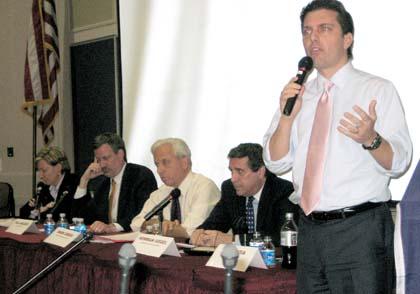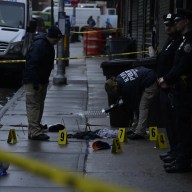By Anna Gustafson
Shouts of approval rang out when City Councilman Eric Gioia (D−Sunnyside) railed against the MTA’s recent vote to slash service throughout the borough and called for creating a city more affordable for middle−class residents at the first Public Advocate debate of this campaign season last week.
“The MTA has driven themselves into a hole,” Gioia said at the March 31 debate at CUNY Law School. “Congestion pricing could have made this avoidable. We could have avoided these regressive fare increases.”
Many members of the audience cheered after Gioia’s criticism of the Metropolitan Transportation Authority’s recent vote to cut service, include the Q74 bus line that many CUNY students take, and hike the price of a one−way trip from $2 to $2.50.
Gioia joined fellow public advocate candidates Councilman Bill de Blasio (D−Brooklyn), former Public Advocate Mark Green and civil rights attorney Norman Siegel at the 1−1⁄2−hour debate sponsored by the CUNY Law Democrats and New York Democratic Law Students Council.
Candidates vying for the citywide position discussed at the event such topics as transportation, the environment, how to use the federal stimulus money and costs of living in the city.
“The middle class cannot afford to live here anymore,” said Gioia, who represents Woodside, Sunnyside, Maspeth and Long Island City. “How do you attract the middle class back? With great schools and affordable housing.”
Candidates frequently agreed with one another’s view, and they all essentially argued they were running for public advocate in order to be a watchdog to the mayor and bring more accountability to city government.
The position of public advocate, now held by Betsy Gotbaum, is charged with monitoring, reviewing and investigating complaints about services and city agencies, according to the City Charter. The position has existed for 16 years, during which only Gotbaum and Green, presumed to be the frontrunner in the race, have served in the role.
All the candidates spoke out against the City Council slush fund scandal and Siegel said he would create a group of hundreds of volunteers that would consistently look into issues like the scandal. In April 2008, it was found that Council members had steered funds to non−existent organizations or to groups where there could be a conflict of interest.
Candidates also said they would want to look into city Department of Education spending as well as focusing on education in general.
“I’m a public school parent, and I see parents are left out of the process of children’s education all the time,” de Blasio said. “We’re testing kids too much, we’re not engaging our parents, and we’ve had in this administration a constant desire to take money away from the classroom.”
Green said if elected he would put pressure on city officials to push environmentally friendly policies.
“We should require big buildings to do energy audits,” Green said. “We should use the stimulus money to give tax incentives to the private sector to make green jobs available.”
The only area where one candidate parted ways with his colleagues was on the topic of Gotbaum. While Gioia, Green and de Blasio praised the public advocate’s work in the past eight years, Siegel slammed Gotbaum.
“She was not a good public advocate,” he said. “She was not visible, she was not vocal and most people in the city do not know who the public advocate is.”
Reach reporter Anna Gustafson by e−mail at agustafson@cnglocal.com or by phone at 718−229−0300, Ext. 174.































